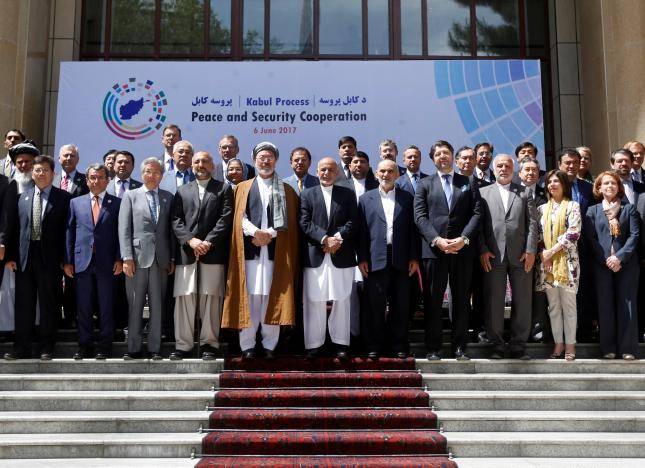KABUL: Afghanistan’s president said Tuesday that last week’s suicide truck bombing in the heart of the capital killed more than 150 people, making it the deadliest single attack in the country since the 2001 U.S.-led invasion to topple the Taliban.
The attack added to growing concerns about whether Afghan forces can defeat the Taliban or an increasingly destructive Islamic State affiliate without further aid from U.S. and international forces, which formally concluded their combat mission at the end of 2014, switching to a support and counterterrorism role.
No one immediately claimed the bombing, but Afghanistan has alleged Pakistani involvement, accusations denied by Islamabad.
President Ashraf Ghani spoke at the opening of the so-called Kabul Process, a gathering of 23 nations, the EU, U.N. and NATO to discuss security and political issues in the country. He again invited the Taliban to peace talks, calling it their “last chance” to give up their 16-year insurgency and join the political process.
“If Taliban wants to join peace talks, the Afghan government will allow them to open an office, but this is their last chance,” Ghani said.
The Taliban have steadily expanded their reach over the last two years, seizing control of several districts in different parts of the country. Past attempts at peace talks have failed. The Taliban have refused to negotiate with the government until all foreign forces leave, and still refer to themselves as a government in exile, angering authorities in Kabul.
The U.S.-backed government is also struggling to combat an IS affiliate that has carried out a series of major attacks. Ghani said that over the past two years as many as 11,000 foreign fighters have joined the group.
Ghani also renewed his criticism of neighboring Pakistan, saying it was waging an “undeclared war of aggression” against his country. The two countries have long accused each other of turning a blind eye to militants operating along their porous border, and their forces exchanged fire over a border dispute last month.
Ghani said if the Taliban did not soon begin negotiations, he would seek new sanctions against the group as a sponsor of terrorism.
"This is the last chance, take it or face the consequences," he said.
Afghanistan accuses elements in Pakistan, worried about old rival India gaining influence in Afghanistan, of providing support for militant groups like the Taliban, an accusation Pakistan denies.
"What will it take to convince Pakistan that a stable Afghanistan helps them and helps our region," Ghani said.
15/n We've offered Pakistan a vision of prosperity, linking South & Central Asia together thru trade, investment & peaceful co-existence.
— Ashraf Ghani (@ashrafghani) June 6, 2017
16/n & yet today we suffer from an undeclared war of aggression. We won’t get drawn into a blame game. We've tried bilateral, trilateral ..
— Ashraf Ghani (@ashrafghani) June 6, 2017
17/n quadrilateral & even multilateral negotiations to bring an end to conflict & terror. But PAK continues to host terrorist sanctuaries.
— Ashraf Ghani (@ashrafghani) June 6, 2017
18/n PAK still believes that sponsoring terror is a controllable tool that can be switched on and off as part of the means to achieve goals.
— Ashraf Ghani (@ashrafghani) June 6, 2017
19/n This cannot continue. We will not let it continue. We want peace with Pakistan. We want to be able to trust Pakistan. & we want the ..
— Ashraf Ghani (@ashrafghani) June 6, 2017
20/n chance for friendly, cooperative relationships that will reduce poverty & promote growth on both sides of the frontier. Our problem ..
— Ashraf Ghani (@ashrafghani) June 6, 2017
21/n our challenge, is that we cannot figure out what is it that PAK wants. What will it take to convince PAK that a stable #AFG helps them?
— Ashraf Ghani (@ashrafghani) June 6, 2017
22/n We recognize that PAK has legitimate regional security interests & we've offered the appropriate guarantees of neutrality. & v continue
— Ashraf Ghani (@ashrafghani) June 6, 2017
Afghan security forces say they are still investigating, but that the explosives used appear to have originated in Pakistan.
Pakistan’s Foreign Affairs Adviser Sartaj Aziz rejected the allegations, which he said were part of a “malicious agenda” to damage relations between the two countries.
MORE U.S. TROOPS?
Ghani said Afghanistan had provided its preconditions for negotiations to the Taliban, but it remains unclear whether the group's leaders represented all factions.
A spokesman for the Taliban said he was not prepared to make immediate comment on the conference.
The militants have said no talks are possible until all foreign troops leave.
The last significant peace effort foundered in 2015 when news broke that long-time Taliban leader Mullah Mohammad Omar had died.
The push for a new peace process comes as U.S. President Donald Trump has yet to announce his plans for the region, with at least 8,400 American troops training Afghan forces and conducting counterterrorism operations.
Another 6,000 foreign troops contribute to the advising mission.
U.S. military commanders have proposed sending 3,000 to 5,000 more advisers to Afghanistan in a bid to break the "stalemate".
U.S. Charge d'Affaires Hugo Llorens, who is overseeing the American embassy as no new ambassador has been nominated by Trump, said the conference was a chance to send the message that "the enemies of Afghanistan cannot win".
"The conference will be a visible reminder to all those who seek to harm Afghanistan that the Afghan people are never alone, especially in the wake of last week’s attack," Llorens said in a statement.
But some analysts were skeptical that the Kabul Process meetings would lead to peace talks.
"Signing mutual non-interference or anti-terror support agreements won't change anything," said Thomas Ruttig, co-director of the Afghanistan Analysts Network, noting that similar accords had been signed in the past.






